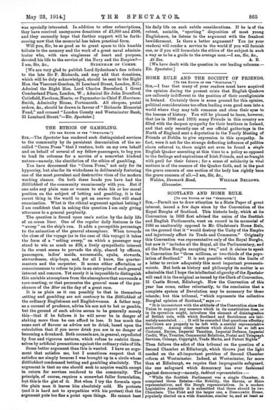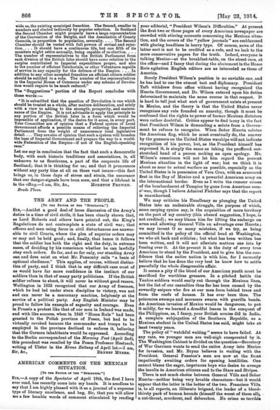SCOTLAND AND HOME RULE.
[To rue EDITOR or 'RR Srzer,roa."1 SIB,—Permit me to draw attention to a State Paper of great interest, issued a few days since by the Convention of the Royal Burghs of Scotland. This historic body, which at its Convention in 1603 first advised the union of the Scottish and English Parliaments, went on record in its memorial of 1886 as unalterably opposed to Mr. Gladstone's Home Rule, on the ground that it " would destroy the Unity of the Empire and injuriously affect its Trade and Commerce." Originally this Convention was representative only of the Royal Burghs, but now it " includes all the Royal, all the Parliamentary, and all the Police Burghs excepting two," and it claims to speak in Convention for "three millions, or two-thirds of the popu- lation of Scotland." It is not possible within the limits of a letter to review adequately this most important proneneia- miento. But both as history and philosophy its matter is so admirable that I hope the intellectual oligarchy of the Spectator will read it in the original as issued by the Clerk of Convention, 21 Castle Street, Edinburgh. Now the Convention of this year has come, rather reluctantly, to the conclusion that a complete system of Devolution may be necessary for these islands; but this tribunal, "which represents the collective Burghal opinion of Scotland," says :—
" It is inconsistent with the attitude of the Convention since the
Union to support any measure which in its constitution does, or in its operation might, introduce the element of disintegration of British rule, with which Scotland and Scotchmen are inti- mately associated. . . . It will be conceded that questions affecting the Crown are properly to be left with a central representative authority. Among other matters which should be so left are Customs, Excise, Imperial Taxation, Imperial Defence, Imperial Credit, War, Treaties, Commercial Relations, Postal and Telegraph Services, Coinage, Copyright, Trade Marks, and Patent Right.."
Then follows the edict of this tribunal on the question of a Second Chamber at Edinburgh, which throws just the light needed on the all-important problem of Second Chamber reform at Westminster. Indeed, at Westminster, far more than at Edinburgh, we require that impregnable safeguard, the one safeguard which democracy has ever fashioned against democracy—namely, indirect representation
:- •• While the Scottish Parliament was a single Chamber, it comprised three Estates—the Nobility, the Barone, or Shire representatives, and the Burgh representatives. In a modern Legislative Assembly it is submitted that there should be two Chambers. The First and the larger one, a Democratic House, popularly elected on a wide franchise, similar to, and at least as
wide as, the existing municipal franchise. The Second, smaller in numbers and elected indirectly by popular selection. In Scotland the Second Chamber might properly have a large representation of the Convention of the Burghs, and the Association of County Councils, in proportion to population, severally. . . . The Second Chamber should be vested with full powers of revisal and rejec- tion. . . . It should have a continuous life, but one fifth of its members might retire annually, being capable of re-election. . . . The number of representatives to the British Parliament from each division of the British Isles should have some relation to the surplus contributed to Imperial expenditure proper, and also to the number of efficient Territorials, or other Volunteers capable of service in any capacity for the defence of the Empire. . . In addition to any other accepted franchise an efficient citizen soldier should be entitled to a vote. The number of the representatives in this Imperial House of Commons under any scheme of Devolu- tion would require to be much reduced."
The "Suggestions" portion of the Report concludes with these words: "It is submitted that the question of Devolution is one which should be treated as a whole, after mature deliberation, and solely with a view to adding to the strength, prosperity, and mainte- nance of the Empire. It is not advisable to apply the principle to any portion of the British Isles in a form which would be impossible of application, if the desire for it arose, in every part. Your Committee are of opinion that a Federal system of Local Government affords a possible means of relieving the Imperial Parliament from the weight of unnecessary local legislative detail.... They are also of opinion that such a system will broaden the base of Imperial Government and prepare the way to a world- wide Federation of the Empire—if not of the English-speaking race."
Let me say in conclusion that the fact that mach a democratic body, with such historic traditions and associations, is, all unknown to us Soutbrons, a part of the corporate life of Scotland; that it is thinking for us; and that it pronounces without any party bias at all on these vast issues—this fact brings us, in these days of stress and strain, the assurance that our danger-signals have been seen, and that a lifeboat is
Breda Place.















































 Previous page
Previous page